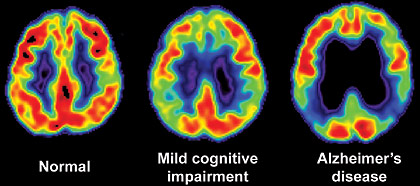What Are the Stages of Alzheimer’s Disease?
 Alzheimer’s Disease is a difficult disease, and not everyone experiences it the same way. The symptoms and their severity can vary by individual. However, there are enough basic similarities that Dr. Barry Reisberg from New York University has been able to identify seven stages of the disease’s progression, known as the Reisberg Alzheimer’s Scale. Knowing these stages will help you understand what your loved one living with Alzheimer’s is experiencing, and help you become an empowered caregiver.
Alzheimer’s Disease is a difficult disease, and not everyone experiences it the same way. The symptoms and their severity can vary by individual. However, there are enough basic similarities that Dr. Barry Reisberg from New York University has been able to identify seven stages of the disease’s progression, known as the Reisberg Alzheimer’s Scale. Knowing these stages will help you understand what your loved one living with Alzheimer’s is experiencing, and help you become an empowered caregiver.
Stage 1 – No Cognitive Decline
During this stage, no impairment is occurring or visible. The disease is active in the brain, but it hasn’t presented itself in an identifiable manner. This stage can last for many years.
Stage 2 – Very Mild Cognitive Decline
This stage is often confused with age-related memory issues. Minor memory lapses begin, like misremembering a name or misplacing something. Often nobody, including your loved one, is aware of that there is a problem and daily life isn’t affected.
Stage 3 – Mild Cognitive Decline
Noticeable change begins in Stage 3. Instead of temporarily forgetting a word, your loved one will have a problem knowing the correct word to use. They may have problems concentrating, organizing their day, or making plans. If they are still working, they may have a problem doing their job. A defensive attitude may develop about having a memory problem.
Stage 4 – Moderate Cognitive Decline
In Stage 4, things start to become confusing. Often, they will retreat from social situations or activities that are challenging. They may become subdued. They don’t keep up with current events. Things like math become hard and they are not able to manage their personal finances.
Stage 5 – Moderately Severe Decline
During Stage 5, someone living with Alzheimer’s needs help with everyday routines like dressing and grooming. They still remember important things about their lives but start to forget details like phone numbers or addresses because their short-term memory is affected.
Phase 6 – Severe Decline
Phase 6 marks a big change. They will become confused and lost in their surroundings, and most activities will require a caregiver’s help. Probably the biggest change will be with their behavior. Sleep will be an issue, and they may experience hallucinations, delusions, anxiety, and agitation.
Phase 7 – Very Severe Decline
Phase 7 is the most severe stage. Suffers are no longer able to take care of themselves. They need help moving, sitting, eating, and swallowing. Often, they lose the ability to speak or communicate.
Alzheimer’s is a frustrating disease that affects people differently, yet still has common symptoms and stages. It is important to understand and recognize each stage so you can get your loved one the appropriate medical care and support.
